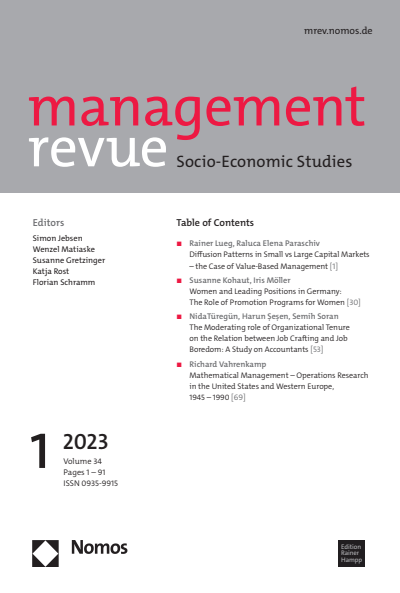Drawing the Line – Turning Social Practices of Smartphone Use Into (In)formal Rules and Regulations
IF 1.7
0 MANAGEMENT
引用次数: 0
Abstract
Today's workplace is strongly influenced by digital information and communication technologies (ICT). Remote work raises new demands regarding employees’ availability as well as work engagement and requires new rules. However, how social practices regulate smartphone use in organisations has seldom been investigated. This paper explores the use of smartphone technology in organisations and how to implement formal rules. The analysis of 12 qualitative in-depth interviews with employees in a profit-oriented and a public service organisation confirms and enriches the types of usage as suggested by Orlikowski’s work on information technologies in organisations. In addition, we suggest reframing the non-enactment of smartphone technology as a constructive practice of ensuring productivity and employee well-being instead of being caused by a lack of technical know-how, or fear of losing power. In addition, three different types of practices for formally governing work-related smartphone use in new work arrangements have been identified: a) formalising the implicit communication etiquette, b) designing rules for specific organisational contexts and c) making use of technical resources. From a practical point of view, we recommend managers introduce a participatory process to design a formal policy that builds on established social practices.划清界限——将智能手机使用的社会实践转变为正式的规则和条例
当今的工作场所深受数字信息和通信技术(ICT)的影响。远程工作对员工的可用性和工作投入提出了新的要求,需要新的规则。然而,社会实践如何规范组织中智能手机的使用却很少被调查。本文探讨了在组织中使用智能手机技术以及如何实施正式规则。对营利性组织和公共服务组织的员工进行的12次定性深入访谈的分析证实并丰富了Orlikowski关于组织中信息技术的使用类型。此外,我们建议将智能手机技术的不实施重新定义为确保生产力和员工福祉的建设性实践,而不是由于缺乏技术知识或害怕失去权力而造成的。此外,在新的工作安排中正式管理与工作相关的智能手机使用的三种不同类型的实践已经确定:a)形式化隐含的沟通礼仪,b)为特定的组织环境设计规则,c)利用技术资源。从实践的角度来看,我们建议管理者引入一个参与式过程来设计一个建立在既定社会实践基础上的正式政策。
本文章由计算机程序翻译,如有差异,请以英文原文为准。
求助全文
约1分钟内获得全文
求助全文
来源期刊

Management Revue
MANAGEMENT-
CiteScore
1.20
自引率
0.00%
发文量
7
期刊介绍:
Management Revue - Socio-Economic Studies is an interdisciplinary European journal that undergoes peer review. It publishes qualitative and quantitative work, along with purely theoretical papers, contributing to the study of management, organization, and industrial relations. The journal welcomes contributions from various disciplines, including business and public administration, organizational behavior, economics, sociology, and psychology. Regular features include reviews of books relevant to management and organization studies.
Special issues provide a unique perspective on specific research fields. Organized by selected guest editors, each special issue includes at least two overview articles from leaders in the field, along with at least three new empirical papers and up to ten book reviews related to the topic.
The journal aims to offer in-depth insights into selected research topics, presenting potentially controversial perspectives, new theoretical insights, valuable empirical analysis, and brief reviews of key publications. Its objective is to establish Management Revue - Socio-Economic Studies as a top-quality symposium journal for the international academic community.
 求助内容:
求助内容: 应助结果提醒方式:
应助结果提醒方式:


